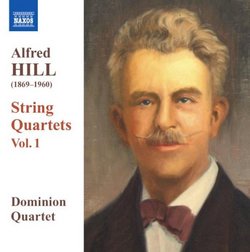| All Artists: Alfred Hill Title: Alfred Hill: String Quartets, Vol. 1 Members Wishing: 0 Total Copies: 0 Label: Naxos Original Release Date: 1/1/2007 Re-Release Date: 6/26/2007 Genre: Classical Styles: Chamber Music, Historical Periods, Classical (c.1770-1830) Number of Discs: 1 SwapaCD Credits: 1 UPC: 747313049172 |
Search - Alfred Hill :: Alfred Hill: String Quartets, Vol. 1
 | Alfred Hill Alfred Hill: String Quartets, Vol. 1 Genre: Classical
|
Larger Image |
CD Details |
CD ReviewsString Quartets by an Australasian Musical Pioneer J Scott Morrison | Middlebury VT, USA | 07/16/2007 (3 out of 5 stars) "Alfred Hill (1869-1960) was born in Melbourne, Australia to a musical couple who had immigrated from England. The family moved to New Zealand when he was very young and he spent his childhood there until, on advice of Ede Remenyi, a touring Hungarian musician -- the violinist, one remembers, whom the very young Brahms accompanied on a European recital tour in 1852 -- he was sent at fifteen to study in Leipzig. He did well in his studies there and even played violin in the Leipzig Gewandhaus Orchestra for a time. He returned to New Zealand where he lived for twenty or so years before moving to Australia where he spent the rest of his life. He was primarily known for his operas and operettas, most of them written and performed in Australia, and for his thirteen symphonies. Grove's Dictionary is silent on the number of string quartets he wrote, although recent research (according to the booklet notes by Donald Maurice) indicate he wrote seventeen of them. On this disc, labeled 'Volume 1', we get the first three quartets.
The First Quartet is a four-movement student work but after his return to New Zealand he revised it, substituing two new movements. That it originated as a student effort is fairly obvious. The outer movements are rather naively constructed and the seams show. Their melodic content is rather foursquare and triadic. But the second movement is more complex, even containing measures in 7/8 time, and in the finale there is inclusion of Maori-influenced melodies. The playing of the Dominion Quartet, three of whose members are principals in the excellent New Zealand Symphony Orchestra, is not as assured in the First Quartet as in the succeeding two; perhaps they were not as convinced of its worth. Whatever the reason, their tone here is marginally thinner and ensemble less secure. The Second Quartet (1907-1911) is subtitled 'A Maori Legend in Four Scenes'. The composer supplied an extensive narrative outlining a tale about the fashioning for the hero, Rata, of a magical canoe which would 'bear him across unknown seas.' Figuring in the tale are a powerful talisman, a forest monster, a lovely maiden, a beautiful crane, helpful woodpeckers, a wicked priest, and a kauri, a beautiful New Zealand tree from which the canoe is constructed. For all the Maori underpinning, the quartet seems influenced musically by Dvorák, which is not too odd considering that this music, like Dvorák's, is meant to be nationalistic. I don't know much about Maori folksong but from what I've heard it seems somehow akin harmonically, melodically and rhythmically, to that of middle Europe. The Third Quartet is a more ambitious work and sounds for all the world like something that might have come from one of the nationalistic composers of central Europe perhaps twenty or thirty years earlier. Strangely, in the fourth movement the abandoned strumming of gypsy music seems to make an appearance, but then perhaps this is an unconscious reference to similar movements by Brahms. One could not from this music consider Hill to be a major composer, but he clearly paved the way for succeeding composers of Australasia. His music was popular Down Under in its day but even there it has largely disappeared from concert programs, much like the music of Chadwick and Macdowell in the US. It is good to hear this composer's efforts -- I had read of him periodically over the years but had never heard a note of his music -- but I strongly suspect these present works will not find a place in the international repertoire. Perhaps later quartets will impress us more. Scott Morrison" |

 Track Listings (12) - Disc #1
Track Listings (12) - Disc #1